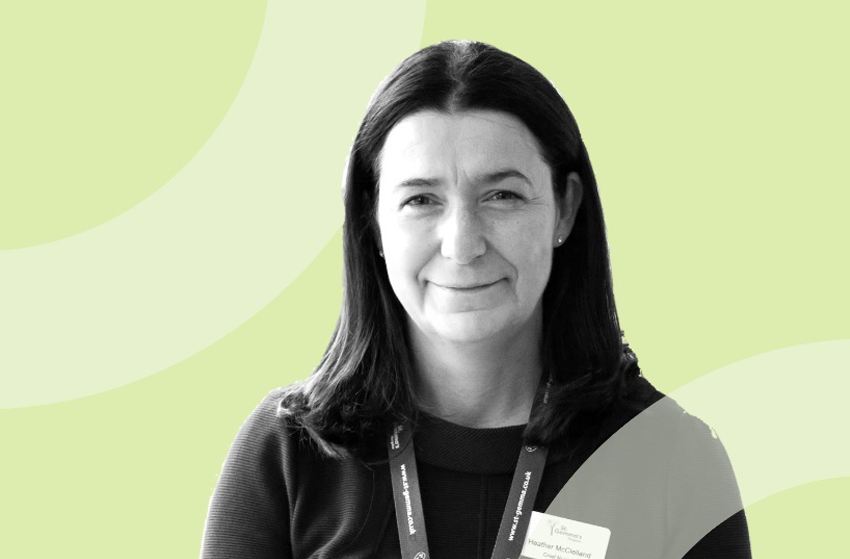Heather McClelland is the Chief Nurse at St Gemma’s Hospice, one of two hospices in Leeds and which covers the eastern part of the city. It is her role to support the ongoing provision of the best possible care and quality of life for local people both at the Hospice site and in the community. Here she talks to Partner, Heather Greatrex, on how they approached Covid-19 and the benefits of remote conversations for both staff and patients.
St Gemma’s was founded over 40 years ago and has 32 beds, although currently operating at 20. There are 260 staff in total, including shop managers and over 900 volunteers. St Gemma’s provides in-patient and community palliative and end-of-life care, as well as day services with a therapy and nursing team, and adult and children’s bereavement services. The Hospice has a caseload of 200-220 patients who either come in to the Hospice or receive services at home. Approximately 27% of funding is provided by the NHS, with the remainder coming from both their 24 shops and other Fundraising events.
What were your immediate priorities in tackling Covid-19?
The senior leadership team of the hospice comprises the CEO, COO, Chief Nurse and the Chief Medical Officer; our first formal Covid meeting took place on 6 March when we set up a pandemic group and started to put plans into place. Our first priority was staff and patient safety, both in the hospice and out in the community. We had to consider how to protect services whilst knowing that we were going into lockdown and would need to close our retail operations. A key step was to reduce footfall into the building and all points of entry and exit. We also had to take immediate steps in the Income Generation team, cancelling the Spring Fair.
What has been the biggest challenge to date?
Communication. We have the benefit of a very open structure but had the challenge of effective communication to both the public and our own staff. We knew that the staff were anxious and that we had to be very clear in our messaging. Thus we did not just email but we also posted letters to staff. We also substantially increased our communication with our Trustees, keeping them up to date with briefings on a weekly basis. We had daily SLT and clinical leadership team meetings to ensure that every piece of government guidance was understood and acted upon.
Income was not a priority for us at the start. Our reserves are strong and we were continuing to deliver a service. The scale of the financial challenge is more apparent now with furloughed staff and trying to understand what kind of grant we might receive from government. We have started to open some of the shops again.
What positives have your drawn from the crisis?
The resilience and flexibility of staff. Staff have been amazing. Staff have been providing palliative care in full PPE. Substantial changes have had to be made; most staff who can are working remotely. One to one conversations have been taking place via video-conference for the last couple of months – staff and patients are able to have conversations about pain, fatigue, nausea, shortness of breath and also about planning for the future. Remote conversations have provided the opportunity to access more patients – previously the day services were reliant on patients attending the hospice, with the attendant transport issues.
Many of the non-clinical staff have been offering to help out in other ways, for example, housekeeping staff and a trustee have been working in the kitchen. The Fundraising staff have been helping out in the garden and the kitchen. Staff have displayed a remarkable level of adaptability.
How will this crisis change your organisation?
Firstly, income. We will never return to the income generating model from the past and this will drive different priorities. The hospice has annual costs of £11million.
Secondly, we will need to look at the organisational structure and how we communicate and work together.
Thirdly, we need to consider how we interface with patients – whilst face to face may be seen as preferable, the continued use of video-conferencing could allow more consultations as there would be less travelling time.
What are likely to be your leadership priorities in the recovery phase?
Resetting. Leeds as a city has been working hard to stabilise and reset services. We are looking at what we want to keep and what we want to change – we are conscious of the need to live with Covid for some time yet. PPE is still being used for every patient. The hospice has had visitors throughout, although in reduced numbers and the policy has been reviewed on a weekly basis.
Leeds has done a good job working together as a city. There have been lots of changes in how services are commissioned and managed. We need to be involved in those discussions – as a non-NHS organisation we can sometimes be left out.
What have you learned about yourself during the crisis?
I have lots of energy. Most of my career has been spent in emergency care and I feel I am good in a crisis. However, I also know that a crisis is exhausting and energy levels are hard to sustain. It has seemed to some that the SLT are even more exhausted than the front-line staff given the level of decision-making that has been needed over the last few months.
What advice would you give to others?
Wellbeing – needs to be considered from the very beginning. If you look after staff, they will be able to deliver services going forward.
